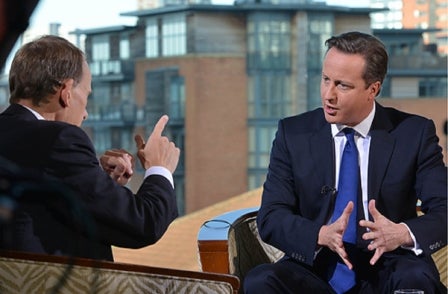
Newspapers could have injunctions imposed on them if they fail to act responsibly by publishing further "damaging" security leaks, David Cameron warned today.
The Prime Minister said it would be difficult for the Government to stand back if the press did not show "social responsibility" when in possession of intelligence material.
He added he did want to use tougher measures, injunctions or D notices, which seek to prevent the media from publishing or broadcasting items on the grounds of national security, but insisted it would be difficult not to act in future cases.
Cameron was replying to a question from Conservative Julian Smith (Skipton and Ripon) on reports that intelligence leaks from former National Security Agency contractor Edward Snowden had led to UK spies losing track of terrorists.
The Guardian newspaper has led the coverage on disclosures from Snowden.
Cameron told the Commons during a statement on the EU Council: "We have a free press, it's very important the press feels it is not pre-censored from what it writes and all the rest of it.
"The approach we have taken is to try to talk to the press and explain how damaging some of these things can be and that is why The Guardian did actually destroy some of the information and discs that they have but they've now gone on and printed further material which is damaging.
"I don't want to have to use injunctions or D notices or the other tougher measures. I think it's much better to appeal to newspapers' sense of social responsibility.
"But if they don't demonstrate some social responsibility it would be very difficult for Government to stand back and not to act."
Smith had asked the PM: "Following The Sun's revelations this morning about the impact of the Snowden leaks, is it not time that any newspaper that may have crossed the line on national security comes forward and voluntarily works with the Government to mitigate further risks to our citizens?"
The Sun quoted a "top surveillance source" as saying that terrorists have "gone quiet" after the publication of details about NSA and GCHQ surveillance activities.
Earlier Labour's David Winnick (Walsall North) urged Cameron to congratulate The Guardian for publishing revelations from Snowden.
He asked the PM: "With the orchestrated campaign and witch-hunting against The Guardian newspaper, would this not be an appropriate time to congratulate that newspaper for publishing the details of how the mobile phone of the German Chancellor had been monitored?
"Do you not consider that sort of information should be in the public domain?"
Cameron replied: "I certainly wouldn't congratulate The Guardian newspaper because I can see what has been done here where information has been published about the work of our security and intelligence services, which quite frankly will make this country less safe.
"We live in a free country so newspapers are free to publish what they want. We have not been heavy-handed and come in with injunctions and all the rest of it, but we do appeal to newspapers to use judgment and common sense and responsibility when they are making these decisions."
Email pged@pressgazette.co.uk to point out mistakes, provide story tips or send in a letter for publication on our "Letters Page" blog
